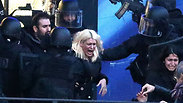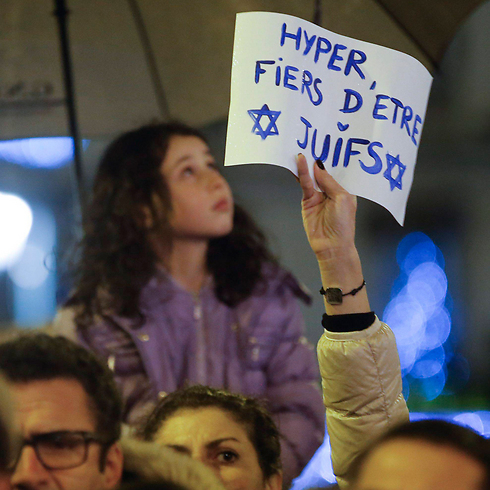
Rabbis: Radical Islam is a threat to Europe's future
In wake of terror attacks in France, Conference of European Rabbis issues a manifesto for combating religious extremism, urging Muslim communities to 'help create meaningful change and realize their responsibilities.'
The Conference of European Rabbis (CER) has issued a manifesto placing the responsibility on the shoulders of Muslim community leaders in Europe, while the organization's president strongly condemned radical Islam, comparing it to Nazism.
"Radical Islam, like the Nazi ideology, is a threat to Europe's future," said CER President Pinchas Goldschmidt, Moscow's chief rabbi.
"The fact that the entire world paid more attention to the massacre at the office of the Charlie Hebdo newspaper than to the massacre of Jews at the Jewish supermarket raises serious doubts about their desire to eradicate and fight anti-Semitism."
The CER announced that it would hold its next conference in Toulouse, "where the radical Islam's killing and murder spree began," in a bid to strengthen Europe's biggest Jewish community.
About half a million Jews live in France, making it the world's third largest Jewish community after Israel and the United States.
"The Jews are and were the first, but not the only, victims in radical Islam's murderous terror campaign," Rabbi Goldschmidt added, sending his organization's condolences to "the families of the victims at the supermarket massacre, the families of the victims at the newspaper office and the family of the Muslim police officer."
'Register all religious congregations'
In a document titled "Manifesto for combating Religious Extremism," the CER notes that "the threat posed by religious extremists is global, immediate, violent and deeply rooted in issues of identity, theology and faith," and urging Muslim communities take responsibility and combat this threat.

The rabbinical organization is also requesting a national register of religious congregations which will, in effect, provide a list of all those congregations who have set the highest possible standards in tackling extremism and will be recognized as such by parliamentarians, the media and the public.
"A place on the register will act as a kite mark for religious groups and would add significantly to their credibility," the CER said.
"The Conference of European Rabbis believes that it is religious communities themselves who should carry the burden of responsibility to offer tangible solutions to this intractable global problem," the rabbis wrote.
"Nobody truly understands the strengths, weaknesses and subtleties of a faith community as well as deeply committed adherents to that faith. They are therefore uniquely placed to create meaningful change and must recognize the responsibilities in this area.
"Platitudes and strongly worded statements distancing mainstream faith communities from acts of terrorism are entirely inadequate. This problem calls for tangible and measurable steps with honest evaluation of progress."
According to the CER, the manifesto was composed in consultation with senior religious leaders across Europe, including Christian and Muslim figureheads.
The rabbis expressed their hope that "leaders of faith communities across the continent will endorse this manifesto" in order to create "a platform for further discussion and more meaningful engagement with the problem by religious figureheads."
'Supervise donations'
The document's authors stress that part of the Muslim leadership in Europe is at the heart of the problem.
"Faith communities have a responsibility to have formalized, recognized, training structures in place which take account of the threat of extremism. In some cases, such training is already in place but it is undermined by the fact that scholars from outside Europe, who might promote extremism can move to western liberal democracies to preach an ideology of hatred.
"The Conference of European Rabbis would like to see all faith leaders receive their training and their salary from within Europe. It may not be practical to refuse residency to scholars who have trained abroad but it is certainly possible to insist that they undertake further training in Europe which specifically deals with the dangers of extremism."
The organization is also insisting that all funds donated to an organization which are greater than 5,000 euros will be made public.
"Any donation from outside Europe should be subject to much closer scrutiny – ideally an independent check. These measures will reduce the covert influence of groups like al muhajiroun and the Muslim Brotherhood."
In addition, according to the CER, every religious organization should have a designated extremism prevention officer to react when concerns are raised about the welfare of children connected to the organization.
"This individual would be expected to create a protocol for identifying and reporting concerns about extremism. He or she would also then be expected to produce regular confidential reports of issues of concern to the relevant authorities.
"This provides law enforcement with a direct link into faith communities. It will also help to ensure that there is an appropriate emphasis on the communities themselves to take responsibility for identifying and reporting incidents of concern."
According to the CER, "The true power of these proposals lies in the fact that they are being proposed and championed by faith groups themselves, rather than being imposed by external agencies.
"The net result of these measures would be to create an atmosphere of confidence that faith communities are taking responsibility for dealing with extremism which will in turn inspire more and more communities to adopt them."
'Aliyah is not the solution'
The European Jewish Association (EJA), meanwhile, has called for heightened security measures in the aftermath of last week’s murderous terrorist attacks in France to protect Europe’s Jewish communities.
"The European Jewish community has long and publicly warned all European governments that any leniency towards any and all acts of terror against minorities will only increase terrorism and its devastating impact on our European societies," said EJA General Director Rabbi Menachem Margolin.
"Nobody can have any doubt that we are in the midst of a new and virulent wave of terror," he added. 'This is the result of a build-up of many young Europeans who have joined the forces of radical Islam, leaving their homelands to join militant forces abroad, before returning to Europe, indoctrinated in the ideology of hate and trained in combat techniques."
Rabbi Margolin also questioned the decision by the Israeli authorities to call for an increase in immigration to Israel from the Diaspora rather than focusing on increasing the security of European Jews.
"Aliyah is one's personal yearning and should definitely be a goal for the State of Israel. However, anyone who is familiar with the European reality knows that a call to aliyah is not the solution for anti-Semitic terror," he said.
"The Israeli government must increase security for the European Jewish community, rather than just repeat Pavlovian calls for aliyah after every terror attack."
According to Rabbi Margolin, Jews who wish to make aliyah do not need this kind of encouragement and continue to immigrate to Israel, recalling the increase of aliyah to Israel from France in recent months and years as evidence of this.
However, "such Israeli campaigns weaken the position of European Jews who choose to remain in their historic homelands, and wish to be able to do so in safety."
The EJA has also called upon European interior ministers to issue gun carrying permits and provide self-defense training to heads of European Jewish communities as well as to Jewish business owners.
Acknowledging the significance of this appeal in the immediate aftermath of a series of gun-related terror attacks in France, Rabbi Margolin emphasized that "special times call for special measures.
"There is absolutely no intention to create a pro-active force. Rather, we expect local authorities to identify, train and oversee all designated armed personnel," he said.
"On January 27, the world will mark International Holocaust Memorial Day. We simply cannot make do with remembering. We have called upon all European governments and nations to acknowledge the darkness that is lurking over Europe, to come to their senses before it is too late.
"Beyond our constant activity raising awareness and calling for action in the European Parliament and among the various governments, we have asked officials to keep the light on in their offices and homes on the eve of the International Holocaust Memorial Day as a pan-European declaration that we are all united in the struggle against the darkness," Rabbi Margolin concluded.
Tali Farkash contributed to this report.










